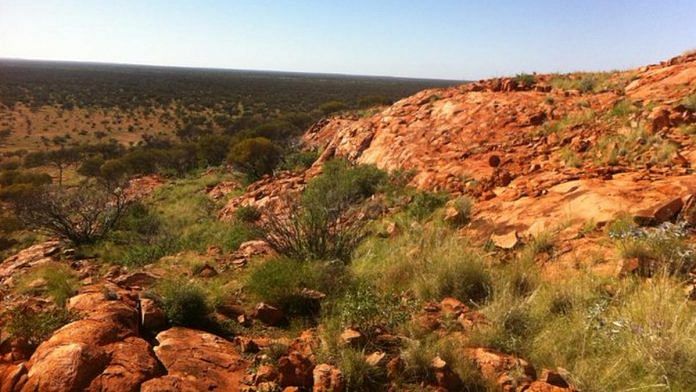Bengaluru: Geologists have confirmed that the world’s oldest impact crater is the Yarrabubba crater in Western Australia. The 70-kilometre-wide Yarrabubba crater was formed during an asteroid or comet strike 2.23 billion years ago.
This was confirmed during a study conducted by a team of US and Australian geologists and published in Nature Communications. An analysis of the crater is expected to provide scientists with information on how Earth had come out of the last ice age.
The Yarrabubba crater lies north of Perth and sits on top of an ancient piece of Earth’s crust called the Yilgarn Craton. It can be barely recognised as an unusual rock formation or even a crater, as its rim has been completely eroded.
But the crater’s formation can be evidenced in tiny zircon and monazite rock crystals present in the area. Precise dating of these crystals have revealed that the impact at Yarrabubba had occurred just as the planet was coming out of its ‘Snowball Earth’ period, when it was largely covered in ice.
Scientists speculate that the impact could have helped bring the Earth out of the ‘ice age’ period.
The age of zircon and monazite rocks were ascertained by examining their crystal grains. Whenever an impact occurs, the large amount of pressure and heat melts and deforms the outer portions of these tiny rock crystals. A close-up of zircon crystals have revealed a core original structure and a deformed ‘area snap’, which was heated by the meteorite impact.
The melted part of the crystals had also trapped uranium in the intense heat, and uranium slowly turns into lead over time. Using a mass spectrometer, the team of scientists had fired beams of ion onto the melted part of these hair-like crystals to date them.
Also read: Indonesia’s sinking capital and over 1 billion animals dead in Australia
Yarrabubba could have caused drastic ice-melting
Until now, the Vredefort Dome, a 2.02-billion-year-old crater in South Africa, which at 250 km also happens to be the world’s biggest, was widely accepted as the world’s oldest known impact crater. But Yarrabubba is older by at least 200 million years.
The impact at Yarrabubba would have also caused drastic melting and vaporisation of ice in the region, releasing huge quantities of water vapour.
Water vapour is one of the most powerful greenhouse gases, more than carbon dioxide and methane. Such an influx of a greenhouse gas into the atmosphere would have started warming up the earth.
Even though there are no rock records of glacial deposits for 400 million years after this impact, the researchers have maintained that this theory, which has been refuted by some, is only speculation.
Scientists do not yet know if Yarrabubba region was indeed covered by ice at the time. They also do not know if atmospheric effects from a collision can persist enough to start a global process of warming through water vapor.
While it is also indeed possible that Yarrabubba might not be the oldest crater on the planet, finding such impact craters are extremely difficult. Due to plate tectonics, craters are often swallowed into the mantle through various geophysical processes like volcanism.
Also read: Scientists at LIGO detect heaviest binary neutron star merger ever known



